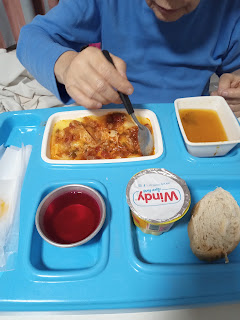The last couple of weeks have been incredibly tough. It all began during the final week of September when what seemed like a simple cough escalated into a terrifying "I can't breathe" moment for my 77-year-old mother.
We rushed her to a private hospital in Córdoba City, where she was diagnosed with acute pneumonia and admitted immediately.
It probably didn’t help that her room number was 13—an infamous symbol of bad luck.
On the first night, my mother didn’t think she was going to make it, and honestly, neither did her doctor. Naturally, she began telling me, as best as she could, that she loved me and would always be with me in spirit.
To make matters worse, my 82-year-old father, who’s not entirely present mentally, wasn’t handling her condition well. This felt ironic, considering that just a year ago, he had accused her of infidelity during their marriage and even threatened her life. As far as I know, none of his allegations are true. In hindsight, I think his accusations were early signs of his cognitive decline. But if I’m being completely honest, I suspect the only reason he was concerned about my mother possibly dying was the prospect of losing someone to cook his meals and do his laundry. Anyway, I digress—back to my mother.
Thankfully, the antibiotics and IV fluids began working, and she slowly started to feel like herself again. However, there was an issue with her IV. Being a careful observer by necessity, I noticed that the IV bag wasn’t emptying and realized the fluid was dripping onto her bed instead. Fortunately, after I pointed this out, a nurse fixed it.
One thing that stood out to me at the hospital was the lack of vital monitors for the patients. This likely explains why the nurses checked on my mother every four hours. Honestly, I was disappointed. You’d think a private hospital would be better equipped than a public one, but both seem pretty much the same. That said, the cleaning staff was exceptional. They cleaned the room and bathroom frequently, ensuring everything was spotless—more often than the nurses checked in, actually.
 |
| My mom actually thought the hospital food was great! |
By the third day, my mother was already making plans for what she wanted to do once she was discharged. She sounded stronger, more determined, and eager to get back to her life. However, her relationship with my father continued to be a problem. One night, she demanded he leave and not return, even instructing the nurses not to let him into her room. This left me as her sole caretaker.
Managing everything wasn’t easy. I had to juggle taking care of her with teaching my online English classes, though I ended up canceling quite a few lessons. Taking care of my recovering mother wasn’t the issue—I’ve been caring for elderly people since I was 13, starting as a volunteer at Waterford Convalescent Center in Hialeah, Florida, for two years. Then in 2008, I helped my husband’s grandparents when they were battling cancer. But this was different.
At Waterford, the patients had nurses and staff. When my husband’s grandparents were sick in Florida, they had other relatives to step in when I couldn’t. Here in Argentina, though, the only family I have are my parents and my husband. My father, as I’ve mentioned, is unreliable due to his mental state. My husband had to stay home to protect our house because Córdoba City's crime rate is absolutely terrible. Leaving our home unattended would almost guarantee a break-in. So, it was just me, without any backup, handling everything for my mother at the hospital.
By Thursday, her doctor said she was well enough to go home, which thrilled her. Once I signed the discharge papers, we left. My dad and I drove her home—thankfully without them killing each other in the car.
She was instructed to rest, avoid crowded areas, wear a mask, and take her medications for the next couple of weeks. She followed these directions, and physically, she’s now much better. Mentally, though, that’s a different story.
A week after she returned home, I began noticing dramatic changes in her personality. At first, they were subtle, and I didn’t think much of it—she’s always been a bit of a hardass. But this was something else.
She started giving away her furniture and decided to remodel her house. She replaced an old window in her bedroom, retiled her bedroom, the main bathroom, and the kitchen, and even had the plumbing redone. Altogether, she spent over 4 million Argentine pesos in less than a month. Currently, 4 million Argentine pesos (ARS) is approximately $4,008 USD.
Had she suffered from hypoxia - a condition where tissue is deprived of oxygen? Could this have caused brain damage?
To make matters worse, she became fixated on evicting the tenants in one of our family’s rental properties. This turned into a nightmare and ultimately caused a major rift between us, one that might have severed our emotional connection forever.
But I’ll save that for my next post.






No comments:
Post a Comment